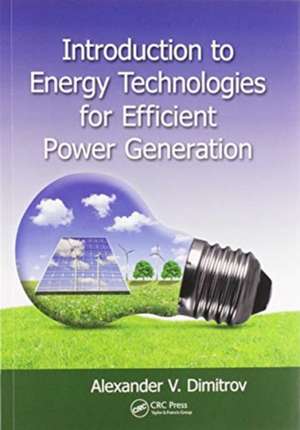Introduction to Energy Technologies for Efficient Power Generation
Autor Alexander V. Dimitroven Limba Engleză Paperback – 30 iun 2020
| Toate formatele și edițiile | Preț | Express |
|---|---|---|
| Paperback (1) | 437.71 lei 6-8 săpt. | |
| CRC Press – 30 iun 2020 | 437.71 lei 6-8 săpt. | |
| Hardback (1) | 1008.02 lei 6-8 săpt. | |
| CRC Press – 23 feb 2017 | 1008.02 lei 6-8 săpt. |
Preț: 437.71 lei
Nou
Puncte Express: 657
Preț estimativ în valută:
83.76€ • 91.35$ • 70.62£
83.76€ • 91.35$ • 70.62£
Carte tipărită la comandă
Livrare economică 24 aprilie-08 mai
Preluare comenzi: 021 569.72.76
Specificații
ISBN-13: 9780367573850
ISBN-10: 0367573857
Pagini: 280
Dimensiuni: 178 x 254 x 15 mm
Greutate: 0.49 kg
Ediția:1
Editura: CRC Press
Colecția CRC Press
Locul publicării:Boca Raton, United States
ISBN-10: 0367573857
Pagini: 280
Dimensiuni: 178 x 254 x 15 mm
Greutate: 0.49 kg
Ediția:1
Editura: CRC Press
Colecția CRC Press
Locul publicării:Boca Raton, United States
Cuprins
Theoretical foundations of thermotechnics and power engineering. Conversion of thermal energy into mechanical work (thermal engines). Thermoelectric and co-generation technologies. Energy conversion (regeneration and recuperation). Heat transfer and accumulation. Energy and interior environment. Concluding remarks. Applications. Information Resources.
Notă biografică
Alexander Dimitrov is a professional lecturer with 35 years of experience at four different universities. In addition to universities in Bulgaria, Dr. Dimitrov has lectured and studied at leading scientific laboratories and institutes in other countries, including the Institute of Mass and Heat exchange ”Likijov”, Byelorussian Academy of Sciences, Minsk; Lawrence Berkeley National Laboratory, Environmental Energy Technology Division, Indoor Environment Department; UNLV –ollege of Engineering, Center for Energy Research; Stanford University, California, Mechanical Department. Professor Dimitrov has conducted systematic research in energy efficiency, computer simulations of energy consumption in buildings, the distribution of air flow in an occupied space, modeling of heat transfer in building envelope, and leaks in the ducts of HVAC systems.
Professor Dimitrov has defended two scientific degrees: Doctor of Philosophy (in 1980 - Ph.D.) and Doctor of Science (in 2012 - D.Sc.). With significant audit experience in the energy systems of buildings and their subsystems, he has developed an original method for evaluating the performance of the building envelope and energy labeling of buildings. He also has experience in the assessment of energy transfer through building envelope and ducts of HVAC systems. Professor Dimitrov's methodology has been applied in several projects with great success. He has developed a mathematical model for assessment of the environmental sustainability of buildings, named BG_LEED. He earned his Professor Degree in “Engineering Installations in the Buildings” with the dissertation “The building energy systems in the conditions of environmental sustainability” at European Polytechnical University in 2012. Subsequently, he has authored more than 100 scientific articles and 9 books, including 4 in English.
Professor Dimitrov has defended two scientific degrees: Doctor of Philosophy (in 1980 - Ph.D.) and Doctor of Science (in 2012 - D.Sc.). With significant audit experience in the energy systems of buildings and their subsystems, he has developed an original method for evaluating the performance of the building envelope and energy labeling of buildings. He also has experience in the assessment of energy transfer through building envelope and ducts of HVAC systems. Professor Dimitrov's methodology has been applied in several projects with great success. He has developed a mathematical model for assessment of the environmental sustainability of buildings, named BG_LEED. He earned his Professor Degree in “Engineering Installations in the Buildings” with the dissertation “The building energy systems in the conditions of environmental sustainability” at European Polytechnical University in 2012. Subsequently, he has authored more than 100 scientific articles and 9 books, including 4 in English.
Recenzii
"A compact reference on power engineering that all the civil engineers and architects should have on their shelf."
— Vincenzo Bianco, University of Genoa, Italy
"The book covers In-depth descriptions of both mature and emerging power generation technologies."
— Cheng-Xian Lin, Florida International University, USA
"The author’s versatile experience in blending the right mix of academia with the real world energy systems will encourage the readers to study thermodynamics and heat transfer concepts with much more interest."
— R. Venkatesh, PSG College of Technology, India
"The book incorporates the principles of thermodynamics from a physical chemistry viewpoint as well as an engineering perspective. The text is comprehensive in the fundamental development of the governing relations associated with thermodynamic cycles, and provides the reader with a nice background in the history of theoretical engine cycle development."
— Darrell W. Pepper, University of Nevada Las Vegas, USA
— Vincenzo Bianco, University of Genoa, Italy
"The book covers In-depth descriptions of both mature and emerging power generation technologies."
— Cheng-Xian Lin, Florida International University, USA
"The author’s versatile experience in blending the right mix of academia with the real world energy systems will encourage the readers to study thermodynamics and heat transfer concepts with much more interest."
— R. Venkatesh, PSG College of Technology, India
"The book incorporates the principles of thermodynamics from a physical chemistry viewpoint as well as an engineering perspective. The text is comprehensive in the fundamental development of the governing relations associated with thermodynamic cycles, and provides the reader with a nice background in the history of theoretical engine cycle development."
— Darrell W. Pepper, University of Nevada Las Vegas, USA
Descriere
This book serves as a guide for discovering pathways to more efficient energy use.
